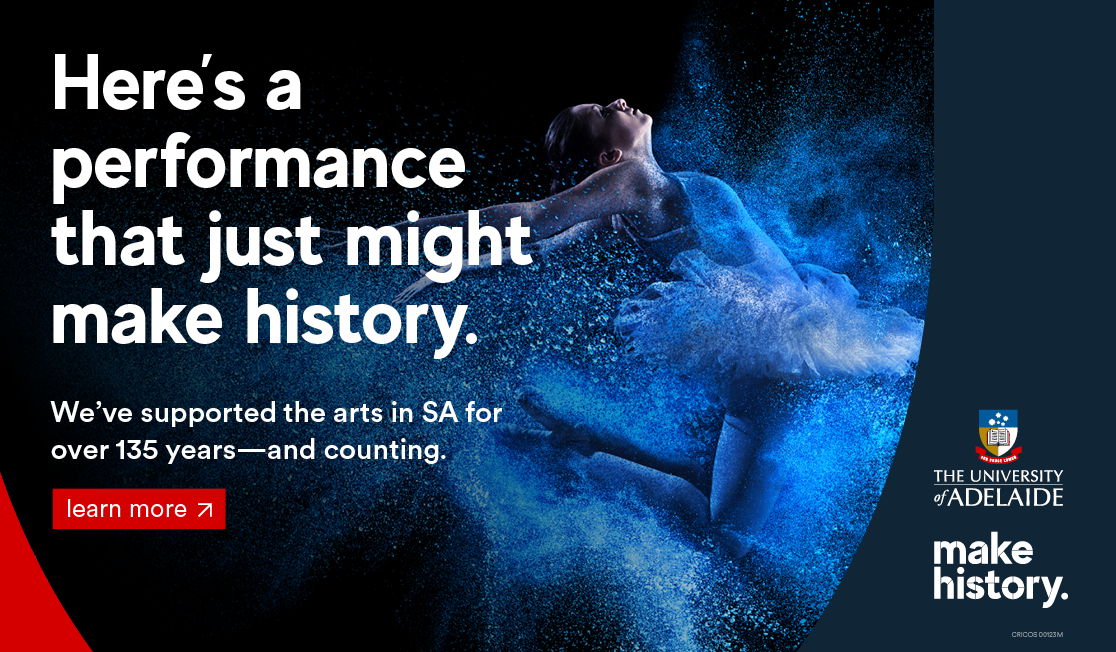Your Daybill
Info
Your Daybill content
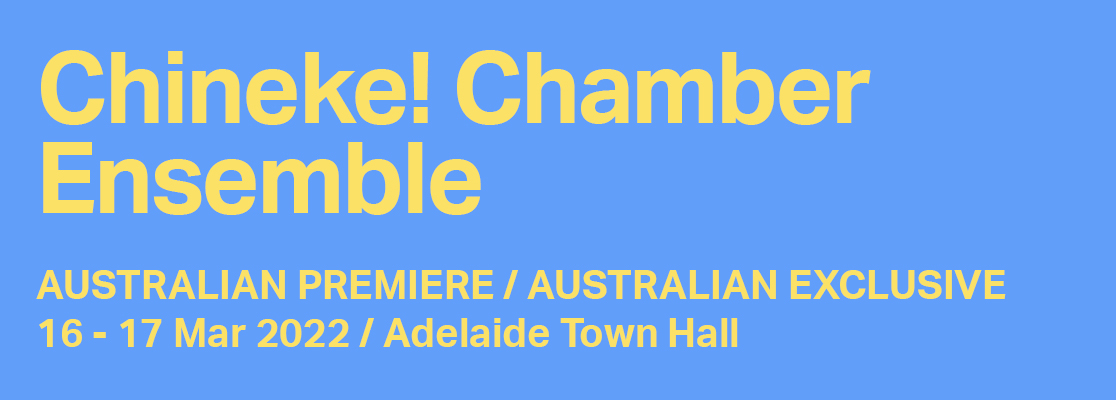
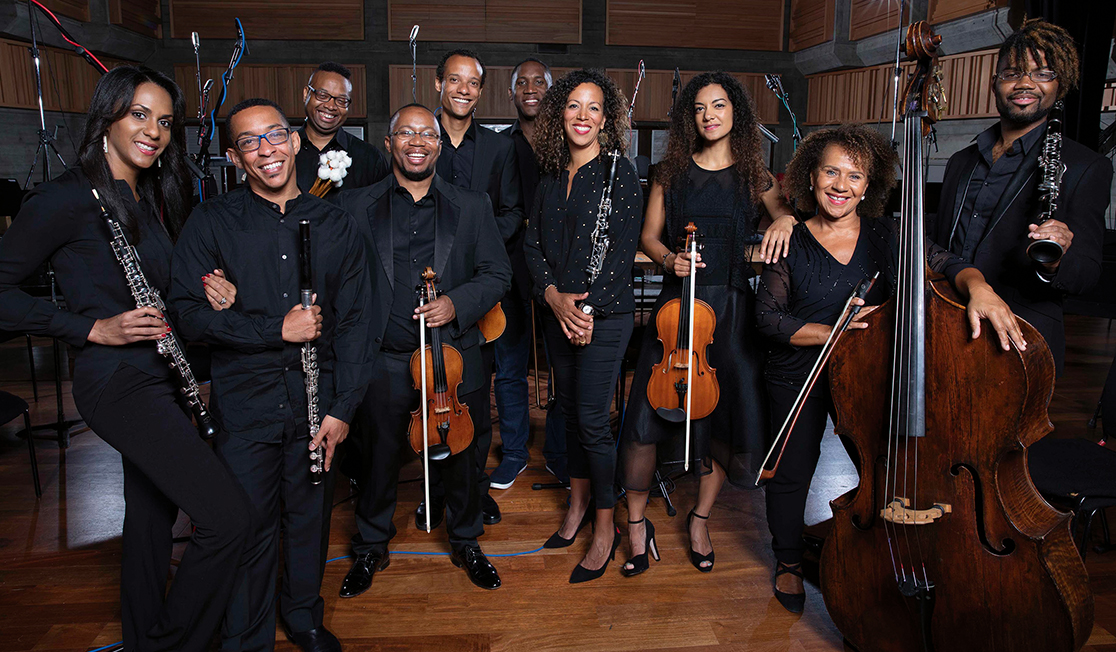
Duration
Program One: 1hr 40 mins, incl interval
Program Two: 2hrs, incl interval
Supported by the UK/Australia Season patrons Board, the British Council and the Australian Government as part of the UK/Australia Season.
![]()
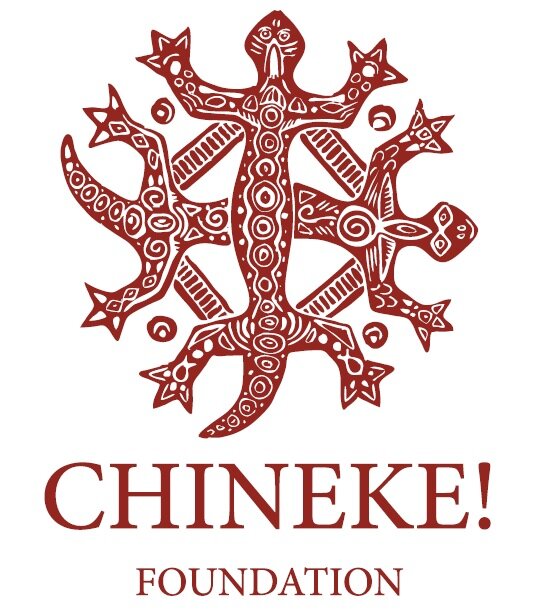
![]()

Share your AF experience
@adelaidefestival
@adelaidefest (twitter only)
#AdlFest #AdelaideFestival
Images (top to bottom) Eric Richmond; Matt Jolly (© Britten Pears Arts); Eric Richmond and Joe Swift
About Chineke! Chamber Ensemble
Chineke! was founded in 2015 by double bass player Chi-chi Nwanoku OBE to provide career opportunities for young Black and ethnically diverse musicians in the UK, Europe and further afield. Chineke!’s mission is: "Championing change and celebrating diversity in classical music."
The Chineke! Chamber Ensemble comprises the principal players of the Chineke! Orchestra. It has performed in venues across the UK and in the USA and is delighted to be performing in Australia for the first time at the Adelaide Festival.
Chineke! chamber ensemble Musicians
Hannah White, violin
Natalia Senior-Brown, viola
Ashok Klouda, cello
Chi-chi Nwanoku OBE, double bass
Shantanique Moore, flute
Armand Djikoloum, oboe
Mebrakh Haughton-Johnson, clarinet
Linton Stephens, bassoon
Francisco Gomez, French horn
Gerard Aimontche, piano
Chineke! Foundation
Founder, Artistic & Executive Director Chi-chi Nwanoku OBE
General Manager Stephen Carpenter
Projects Officer Ellie Argente
Learning & Participation Manager Ishani O'Connor
Program
Program one
wed 16 mar, 8.30pm
Bohuslav Martinů (1890 - 1959) Nonet No.2, H.374
Poco allegro
Andante
Allegretto
Sergei Prokofiev (1891 - 1953) Quintet in G minor, Op.39
Tema con variazioni
Andante energico
Allegro sostenuto, ma con brio
Adagio pesante
Allegro precipitato, ma non troppo presto
Andantino
Valerie Coleman (born 1970) Red Clay and Mississippi Delta
Interval
William Barton (born 1981) World Premiere: The Rising of the Mother Country*
Samuel Coleridge-Taylor (1875 - 1912) Nonet in F minor, Op.2
Allegro energico
Andante con moto
Scherzo. Allegro
Finale. Allegro vivace
* Published by G. Schirmer Australia Pty Ltd. By kind permission of the Wise Music Group.
Program two
Thu 17 Mar, 7.30pm
William Grant Still (1895 - 1978) Folk Suite No. 1
Bambalelê Espingada
Motherless Child
Two Hebraic Melodies - Artsa Alinu and Ayzeh Peleh
Josef Rheinberger (1839 - 1901) Nonet in E-flat major, Op.139
Allegro - Moderato - Adagio - Allegro vivo
Menuetto. Andantino - Trio – Menuetto d.c.
Adagio molto
Finale. Allegro - Adagio molto - Allegro vivo
Interval
Deborah Cheetham (born 1964) World Premiere: Ngarrgooroon
Franz Schubert (1797 - 1828) Piano Quintet in A Major, D.667 "Die Forelle" (The Trout)
Allegro vivace
Andante
Scherzo. Presto
Tema con variazione. Andantino
Allegro giusto
Program Note
Chi-chi Nwanoku
It is thrilling to make our Chineke! Chamber Ensemble debut at the Adelaide Festival. It’s also the first time for Chineke! to appear in Australia, so marks a momentous step for us in our young career. We are in our sixth year and the need for an ensemble and orchestra such as Chineke!, an orchestra of majority Black and ethnically diverse musicians, whose mission is "championing change and celebrating diversity in classical music", has been evident for a long time in the industry.
One of the aspects about our programming choices for the Adelaide Festival is that there are no two pieces in either program where any of the composers are from the same cultural or ethnic background or country. We are also proud to champion new commissions by living Australian Indigenous composers in each of our concerts. These elements alone personify the philosophy of inclusion and belonging that runs through Chineke!'s veins.
From the word go, we have always included at least one piece of music in every single concert that has been written by a composer of relative ethnicity, so these concerts continue that tradition. We would have loved to have brought the entire Chineke! Orchestra with us to the Festival, but in their absence, I wanted to get as close to that as possible by bringing a full cross-section of the orchestra that includes one of each string and wind instrument. We were sorry not to be able to show off our incredible brass, timpani and percussionists this time, and will try to make lots of noise to compensate for their absence. Hopefully they will be able to join us next time.
About program one
There is a distinct feeling of northern Europe with the opening two pieces of the first concert. Bohemian composer Martinů's nonet is immediately captivating and playful with characterful flashes that remind me of Stravinsky. The second movement brings a noble-sounding melancholy, and I find it extraordinary how every instrument is deployed individually yet weaves a magical thread that binds them. The last movement opens with rhythmic figures that echo Stravinsky again and the rest of the movement brings us a rich variety of moods and colours, culminating with a heroic horn solo. Both this and the following Prokofiev quintet immediately bring Stravinsky’s Soldier’s Tale to mind, and this fascinating and challenging quintet seemed like a natural piece with which to follow. There are some quite extraordinary new sounds and harmonic ideas in this piece; it must be played and heard to fully appreciate it.
It has been wonderful discovering the music of African American composer Valerie Coleman, the Founder of Imani Winds. This is one of the reasons I wanted to share her music with the Adelaide audience because I believe her music needs to be heard and played the world over. This will be its debut in Adelaide and possibly even in Australia. Music is movement and there is a strong dance element in this work, so I hope you’ll allow yourselves to be pulled into the deep American south with Valerie Coleman’s Red Clay and Mississippi Delta with its thrilling example of riveting, bluesy and virtuoso wind writing that will have you dancing well into the interval.
It was such an honour to commission the peerless William Barton to write a chamber work for the Chineke! Chamber Ensemble to celebrate our Australian debut. A descendant of Wannyi, Lardil and Kalkadunga peoples of Western Queensland, he is widely recognised as one of Australia's finest traditional didgeridoo players and a leading didgeridoo player in the classical world. A true performer of the broadest magnitude, I know this will be a memorable moment for us all both on and off the stage. Of his music, Barton says: “I'm doing what I love, I want to take the oldest culture in the world and blend it with Europe's rich musical legacy.” We’re really looking forward to performing this, and it will be our first venture in immersing ourselves into music that we know reaches the furthest possible back into the earliest influences in history.
I wanted to end this program with as full a selection of instruments and players as possible, and the glorious nonet by Black-British composer Samuel Coleridge-Taylor was the perfect choice. One of the most life-affirming and exciting discoveries we found in time for the very first Chineke! concert in September 2015 was the music of Coleridge-Taylor. It felt extraordinary to all 62 of us in that inaugural concert that not a single one of us had ever been taught or played a piece of Coleridge-Taylor’s throughout our lives. We have since gone on to discover many gems of his and in this program have included one of our favourite pieces of his. It was Opus 2, literally the second piece of music he ever wrote after entering the Royal College of Music in London with a violin scholarship. Stanford, the Principal of the institution, insisted every student, regardless of their instrument or voice, must learn to compose. It’s clear to hear in this teenage composer’s mind that he had a very big musical landscape in mind. One thing that has always struck me with his music is its accessibility to players and audiences. Just listening to his melodies and slow movements, especially, it is clear that he wrote from the heart.
About Program Two
Our second program combines a vibrant mix of cultures, ethnicities and nationalities, just like the first program, and this time opens with a Folk Suite by African American composer William Grant-Still. Nicknamed the 'Dean of Afro-American composers', this outstanding composer experienced a life-full of ‘firsts’ in virtually every professional way imaginable. As well as being the first Black person to conduct a professional American orchestra, his famous first symphony, known as the Afro-American symphony (that Chineke! Orchestra performed and recorded last year - soon to be released!) was, until 1950, the most widely performed symphony composed by an American and performed by a leading orchestra. He was the first African American to have an opera performed by a major opera company, and the first to have an opera performed on national television. If you can find a moment to seek out his first symphony you will hear music that sounds familiar from that bygone era of the early 1930s in New York. No doubt you will know where Gershwin got it all from!
The next piece by Joseph Rheinberger is clearly bringing us back to the typically classical idiom. As you will hear, its style and form is highly influenced by the rich history of the western European classical school, and this brings a variety of opportunities with the range of instruments used in its four movements.
It is wonderful to have the opportunity to commission Deborah Cheetham, Yorta Yorta woman, soprano, composer and ultimate mover and shaker in her prowess as an educator, leader and pioneer for diversity, inclusion and belonging in the classical music industry in Australia. She is my sister in her tireless mission, as we sit on each other’s shoulders to create opportunities and shine a light on those historically neglected from this musical sector. I invited Deborah to write us a nonet as it will give a wonderful balance to the other large chamber works in our program, so we can enjoy the broad range of sound possibilities available.
We end with a favourite amongst many chamber music lovers: joyful piano quintet The Trout by Franz Schubert. As a double bassist, not only is it one of the few timeless pieces of chamber music that includes my instrument, but it has also been a regular companion and an absolute mainstay throughout my professional career. Many ask me whether I tire of it, and despite three commercial recordings and hundreds of performances of The Trout, I can happily and honestly say 'no', and I don’t think I ever will. It is youthful and epitomises happy times with a group of friends communing together through music, as we will be in Adelaide, enjoying playful themes, variations, immersing in the luscious moments of the second movement, and dancing away with the virtuoso fifth and final movement. This music remains young in its conception and remains young in my heart, as I hope it does with you.
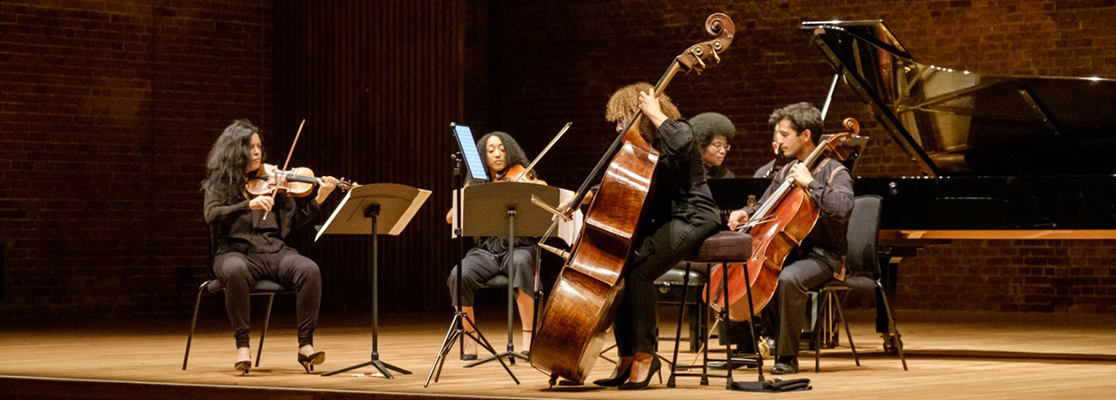
About The Rising of Mother Country
a memory - a living canvas of our journey in life, each chapter captured and re-lived through a songline, a chant, a lullaby
William Barton
This work has been written for piano, bassoon, horn, flute, oboe, clarinet, violin, viola, cello, double bass, didgeridoo and voice, for the world premiere at the Adelaide Festival 2022
In composing this piece, I draw on the strength of each individual performer, as I reflect on our mother country. I visualise the coming together of all nations - a thought of the lullaby which may remain with each player.
In this world of 2022, what is it that we carry from our DNA in this day and age? What is it we carry onto the next generation of story tellers?
Each instrument interprets a part of the players landscape, their own history and bloodlines of their mother country - we in turn welcome people into a safe space - the lullaby, like chant - the player has chosen their instrument as a way of communication, a modern day paint brush.
This work about our mother country and unity also highlights the truth of hardships and the importance of language, cultural heritage and respect of legacy acknowledging generations before us and their contributions to society. I hope the music written helps reflect on the true spirit of heart and soul.
The Rising evokes that memory- like the flowing of the rivers - we come back to our mother.
The enchanted lullaby that resonates across our mother country is passed on from generation to generation. Our DNA holds our history, our truths and acknowledgements, as do the trees and the water of the earth. I believe we carry forward the legacy of our ancestors.
From time to time our mother country cleanses and speaks to us through our connection to the earth and the stars. Our Songlines, our spirit, joins as one humanity, a singular frequency morphing into a cacophony of all existence spiralling up and out to the universe and back to us, humanity.
The Rising of Mother Country is, to me, the power we all have collectively that our shared histories of truth are a part of healing, strength and determination. The lullaby of our ancestors resonates through the medium of music, the old chants, that internal heartbeat of our soul.
Our Spirit shall forever live on through our language, our music, our art and culture.
We shall return to our Mother Country.
About Ngarrgooroon
in The woven song series
Deborah Cheetham AO
For more than two thousand generations the First Nations people of Australia have passed on all knowledge of geography, the sciences, medicine and humanity through the visual and performing arts. In traditional cultural practice, the arts are woven together to strengthen purpose and identity. The singer is the dancer, the dancer the painter and the painter the story teller.
The Woven Song, Embassy Tapestry Project, is the embodiment of this principal and is the latest international project by Short Black Opera featuring ten new compositions by Deborah Cheetham AO. The project celebrates works of art from an ancient culture, reinterpreted and recreated by the exceptional weavers at the Australian Tapestry Workshop, inspiring a contemporary response in current classical music practice. It is an innovative project that breathes new life into each work, honouring the artistic excellence of the artists involved in creating these three-dimensional works of cultural expression.
Ngarrgooroon was commissioned by Chineke! for their debut appearance at the Adelaide Festival in 2022 and is the sixth work in Deborah Cheetham’s Woven Song series. Inspired by the language, art and culture of Senior Gija Artist Patrick Mung Mung, Ngarrgooroon is the story of country and the connection which has been maintained for millennia. Ngarrgooroon is the powerful subject of the Embassy Tapestry which resides in the Australian Embassy in Dublin.
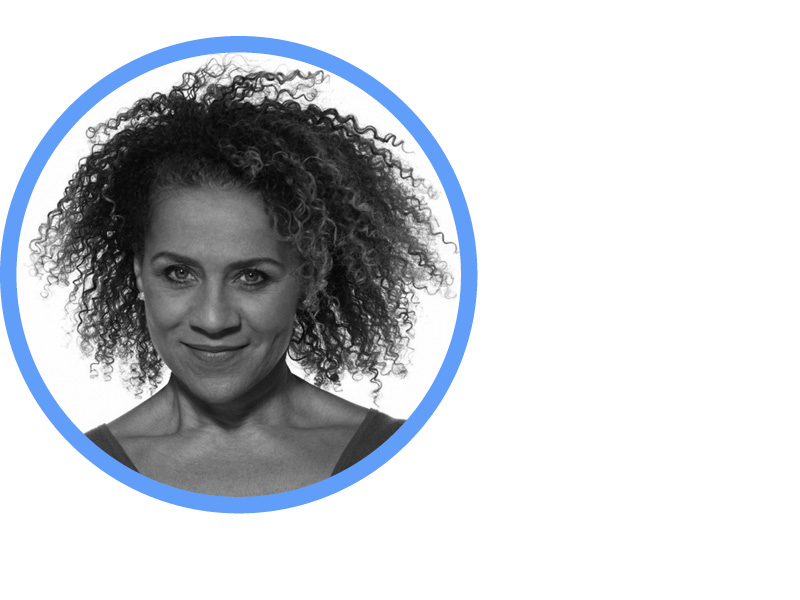
Chi-chi Nwanoku OBE
Founder, Artistic & Executive Director, Chineke! Foundation | Double Bass
Double bassist Chi-chi Nwanoku OBE is the Founder, Artistic and Executive Director of the Chineke! Foundation. Chi-chi has been instrumental in creating opportunities for talented Black and ethnically diverse musicians through the Chineke! Orchestra and Chineke! Junior Orchestra, commissioning new works and championing historical composers of diverse heritage, and by establishing scholarships with the major UK conservatoires. She also created the ABO/RPS Salomon Prize, which celebrates ‘unsung heroes’ working in the ranks of British orchestras.
Chi-chi is a Professor and Fellow of the Royal Academy of Music, an Honorary Fellow of Trinity Laban Conservatoire and Honorary Doctor at Chichester University and the Open University. In 2017, Chi-chi was awarded the OBE for Services to Music, and in 2021 she was named the first Ambassador for Intergenerational Music Making, a charity which aims to bring generations together through innovative music therapy and creative projects. She has featured in the Powerlist of Britain’s 100 Most Influential Black People for three consecutive years, from 2019 to 2021. As a broadcaster for TV and radio, Chi-chi has worked with the BBC, Sky Arts, Scala Radio and Classic FM.
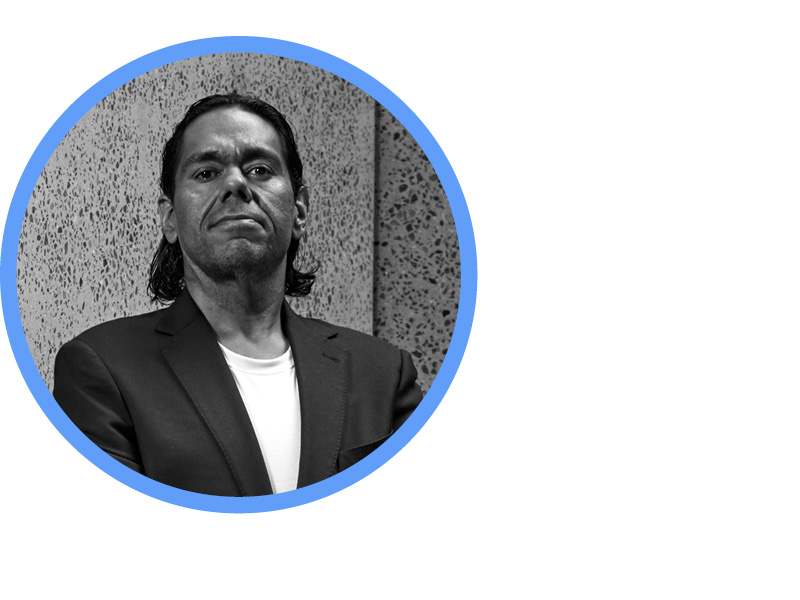
William Barton
Composer
William Barton is Australia’s leading didgeridoo player as well as a composer, instrumentalist and vocalist.
William started learning the instrument from his first learnt the uncle, Arthur Peterson, an elder of the Wannyi, Lardil and Kalkadunga people and was working from an early age with traditional dance groups and fusion/rock jazz bands, orchestras, string quartets, and mixed ensembles.
Throughout his diverse career he has forged a path in the classical musical world, from the London and Berlin Philharmonic Orchestras to historic events at Westminster Abbey for Commonwealth Day 2019, at Anzac Cove in Gallipoli and for the Beijing Olympics.
His awards include Winner of Best Original Score for a Mainstage Production at the 2018 Sydney Theatre Awards and Winner of Best Classical Album with an ARIA for Birdsong At Dusk in 2012. In 2021 he was the recipient of the prestigious Don Banks Music Award from the Australia Council.
With his prodigious musicality and building on his Kalkadunga heritage, William has vastly expanded the horizons of the didgeridoo.
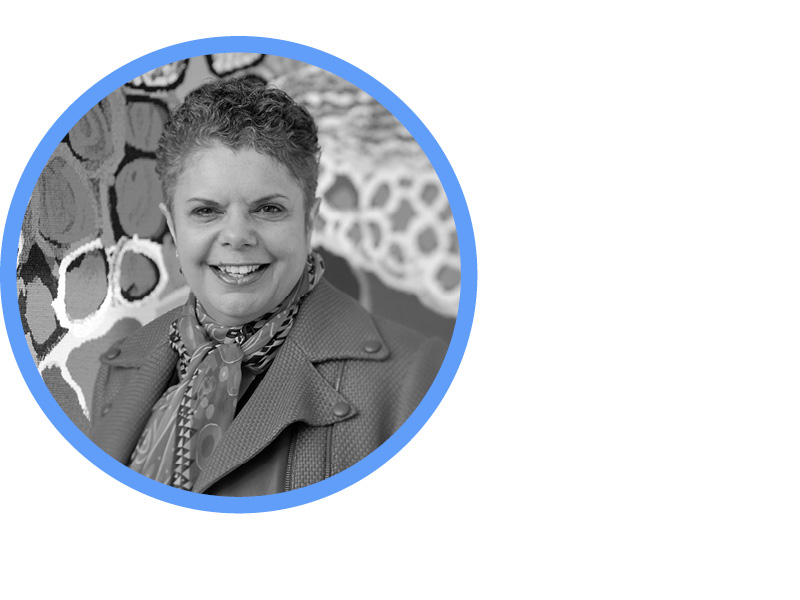
Deborah Cheetham AO
Composer
Deborah Cheetham, Yorta Yorta woman, soprano, composer and Artistic Director, has been a leader and
pioneer in the Australian arts landscape for more than 25 years. In the 2014 Queen’s Birthday Honours List, Cheetham was appointed as an Officer of the Order of Australia (AO).
Deborah's list of commissions for major Australian ensembles including works for the Adelaide, Melbourne, Sydney and West Australian Symphony Orchestras, the Australian String Quartet, Rubiks Collective, The Sydney Philharmonia, Plexus Collective, the Flinders Quartet and the Goldner Quartet. Awards and acknowledgements include: Sir Bernard Heinze Memorial Award for service to music in Australia, Merlyn Myer Prize for Composition, induction onto the Victorian Aboriginal Honour Roll and Women’s Honour Roll of Victoria, Melbourne Recital Centre Life Time Membership, 2019 Melbourne Prize for Music, Limelight Magazine’s Critics Choice Artist of the Year and The Helpmann JC Williamson award for life time service to the arts.
In 2020, Deborah was the Composer-in-residence for the Melbourne Symphony Orchestra and commenced her appointment at the Sir Zelman Cowen School of Music, Monash University as Professor of Music Practice. In 2021, Deborah Cheetham began a five-year appointed as First Nations Chair of Melbourne Symphony
Orchestra.
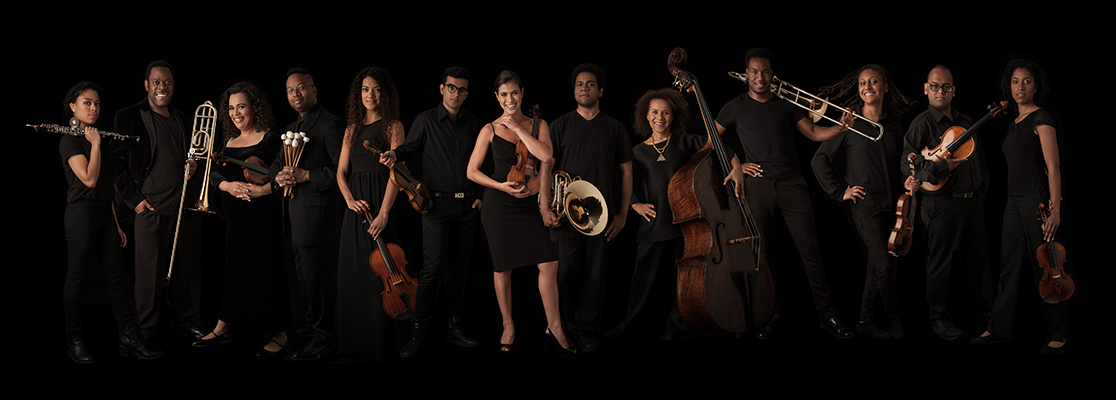






A Sustainable Festival
Adelaide Festival is proudly Carbon Neutral and you can help us reduce our impact on the environment further! Download the Reforest app to track your carbon footprint and plant trees in local reforestation projects to counteract your emissions.


